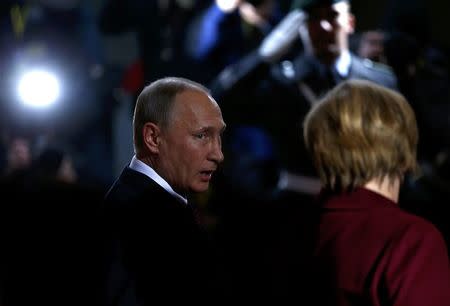Europe's mood hardens on Russia sanctions despite pause in Aleppo bombings

By Robin Emmott and Jan Strupczewski BRUSSELS (Reuters) - European Union leaders condemned Russia on Thursday for its bombing of civilians in Syria's besieged city of Aleppo and Britain, France and Germany backed a push to consider sanctions against Moscow if the atrocities continue. Arriving in Brussels after late-night talks on Wednesday in Berlin with Russian leader Vladimir Putin, French President Francois Hollande said he was seeking maximum diplomatic pressure on Russia to prolong a cessation of bombings in Aleppo that have targeted hospitals and civilians. "All the options are open as long as the truce is not respected and as long as there is a will to crush a city," Hollande said of Aleppo, where some 275,000 people are trapped and hundreds of people have been killed since a ceasefire agreed by Moscow and Washington broke down. Russia has told the United Nations it will stop bombing eastern Aleppo for 11 hours a day for four days, an announcement that EU officials speculated was timed to coincide with the EU summit in Brussels and as momentum was building to impose more crippling sanctions on the Kremlin. EU leaders were initially reluctant to put more Russians under travel bans and asset freezes as part of European efforts to force Moscow to consider a peace settlement for Syria, the main source of migrants fleeing war and heading to Europe. But Britain and France continued to push for the option, and a senior EU lawmaker close to German Chancellor Angela Merkel, David McAllister, told Reuters that while the EU had limited leverage over Russia "we can still impose new sanctions or increase existing sanctions." A draft of the leaders' final statement condemned Russia's role in the conflict and threatened new sanctions. "The European Council strongly condemns the attacks by the Syrian regime and its allies, notably Russia, on civilians in Aleppo," the draft conclusions, seen by Reuters, read. "Those responsible for breaches of international humanitarian law and human rights law must be held accountable. The EU is considering all options, including further restrictive measures targeting individuals and entities supporting the regime, should the current atrocities continue." The wording, which explicitly does not name Russia in the threat of more punitive measures, was designed to secure the backing of Moscow's allies in Europe, including Cyprus, Hungary, Italy and Greece, according to diplomats. "It will be uncomfortable for the countries that are most friendly with the Russians," said a French diplomat. In a sign of the European anger at the Russian-backed campaign, Merkel denounced the air strikes on Aleppo as "completely inhuman." RUSSIAN WARSHIPS As the EU met to discuss their options over dinner, a fleet of Russian warships carrying fighter bombers made its way along Europe's western coast towards Syria. It is a naval operation that NATO believes is likely to intensify the assault on Aleppo, despite the Russian ceasefire pledge. NATO Secretary-General Jens Stoltenberg said he was seriously concerned about the fleet, which includes Russia's only aircraft carrier. "This may be used to increase attacks on Aleppo ... to increase human suffering," Stoltenberg told reporters. The four-way meeting in Berlin on Wednesday night, which also included Ukraine's President Petro Poroshenko, was focused on ending the violence in eastern Ukraine. Later Merkel, Hollande and Putin had a discussion on Syria which lasted a little over an hour. Separately, Dutch Prime Minister Mark Rutte told reporters in Brussels that he was not optimistic of reaching a deal over a partnership agreement between the European Union and Ukraine, which was rejected by Dutch voters in a referendum in April. Western efforts to pull the former Soviet nation out of Moscow's grasp with the free-trade deal have been complicated by the Dutch vote. "A solution here would need a majority in the Dutch parliament," he said. (This story corrects paragraph 18 to show Rutte was speaking in Brussels) (Additional reporting by Robert-Jan Bartunek, Francesco Guarascio, Noah Barkin, Alastair Macdonald, Philip Bleninsop)

 Yahoo News
Yahoo News 